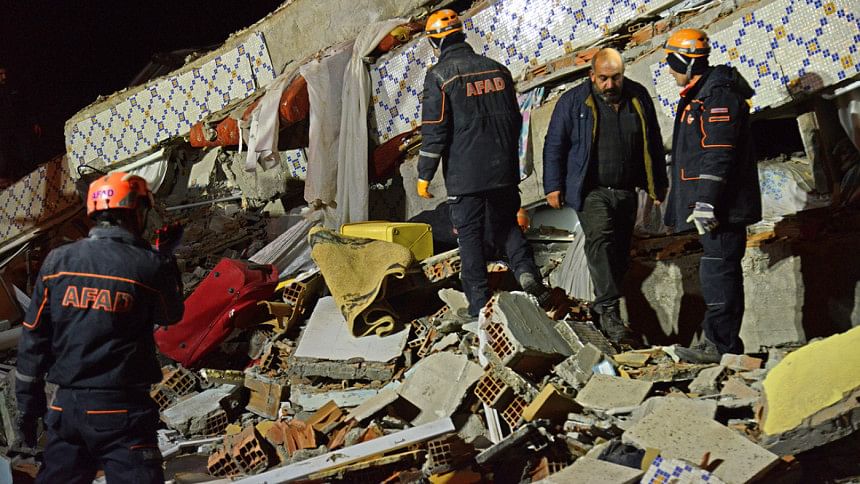Turkey quake kills 22, rescuers dig for survivors

- Magnitude 6.8 quake hits Elazig province, east of Ankara
- Interior minister says 22 still trapped under rubble
- Thousands of rescuers, medical personnel mobilised
The death toll from a powerful earthquake in eastern Turkey reached 22 on Saturday, as rescuers searched for an estimated 22 more people trapped under the rubble of collapsed buildings.
The magnitude 6.8 quake late Friday shook Elazig province, about 550 km (340 miles) east of the capital Ankara, and was followed by more than 390 aftershocks, 12 of which had magnitudes over 4.
Eighteen people were killed in Elazig and four more in the neighbouring province of Malatya, said Turkey's Disaster and Emergency Authority (AFAD), adding 1,031 others were injured and in hospitals in the region. It said rescue efforts were underway at three different sites in Elazig.
Footage early on Saturday showed emergency workers rescuing three people in Elazig after 12 hours under the rubble. A woman was rescued after 13 hours and authorities rescued another woman in Elazig some 15 hours after the quake.
Speaking in Elazig, Interior Minister Suleyman Soylu said 39 people had been pulled out from under the rubble since the quake, but that 22 others were still trapped.
Speaking alongside Soylu, Health Minster Fahrettin Koca said 128 wounded people were still receiving treatment and that 34 of those were in intensive care, but not in critical conditions. He said additional medical centres would be set up if necessary.
State broadcaster TRT showed footage of dozens of workers in the dawn light using shovels to dig out a partly collapsed building in Elazig. Windows were smashed and balconies from at least four storeys had crashed to the ground.
Teams worked through the night with their hands, drills and mechanical diggers to remove bricks and plaster from the ruins in the province where the overnight temperature dipped to -8 degrees Celsius.
“Our houses collapsed ... we cannot go inside them,” said a 32-year-old man from the town of Sivrice, epicentre of the quake which struck shortly before 9:00pm (1800 GMT).
“In our village some people lost their lives. I hope God will help us,” said the man, who gave only his first name, Sinasi. “Our animals died. Our families gathered around the fire to spend the night, covered with blankets,” Sinasi said as he and a relative tried to warm themselves by a small fire.
State media in Syria and Iran both reported the earthquake was felt in those countries. Local media in Lebanon said the cities of Beirut and Tripoli also felt the quake.
On Friday night, Soylu described it as a “Level 3” incident according to the country’s emergency response plan, meaning it called for a national response but did not require international help.
He said Turkey, which straddles seismic faultlines and is prone to earthquakes, had learnt lessons from previous disasters which helped it address Friday's incident. Drones were deployed in search operations and to communicate between provinces.
Emergency teams and rescue equipment were sent from other provinces to Elazig after the quake, with thousands of rescuers and medical personnel on the ground during rescue efforts. Flag-carrier Turkish Airlines started additional flights to Elazig from Ankara and Istanbul to help transport rescuers.
AFAD warned residents not to return to damaged buildings because of the danger of further aftershocks. It said beds, blankets and tents were being sent to the area, where some people sheltered in sports gymnasiums. Turkey’s Kizilay aid group also sent food, heaters and other materials to the region.
“I wish God’s mercy to our brothers who lost their lives in the earthquake, and urgent healing for those who were injured,” President Tayyip Erdogan said on Twitter. He said his Interior, Health, and Environment and Urbanisation ministers were in the region for inspections.
Environment and Urbanisation Minister Murat Kurum, who spoke alongside Soylu on Saturday, said five buildings in Elazig had collapsed in the quake and there were several other heavily damaged structures. He urged residents to avoid entering their homes while experts inspected the damage on buildings.
Turkey has a history of powerful earthquakes. More than 17,000 people were killed in August 1999 when a 7.6 magnitude quake struck the western city of Izmit, 90 km (55 miles) southeast of Istanbul. About 500,000 people were made homeless.
In 2011, an earthquake struck the eastern city of Van and the town of Ercis, some 100 km (60 miles) to the north, killing at least 523 people.

 For all latest news, follow The Daily Star's Google News channel.
For all latest news, follow The Daily Star's Google News channel. 






Comments